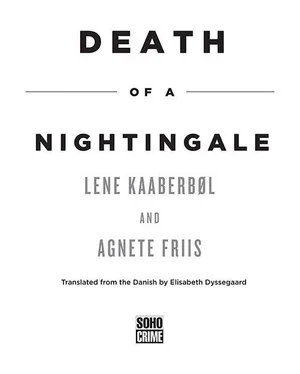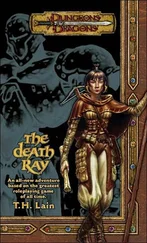Lene Kaaberbol - Death of a Nightingale
Здесь есть возможность читать онлайн «Lene Kaaberbol - Death of a Nightingale» весь текст электронной книги совершенно бесплатно (целиком полную версию без сокращений). В некоторых случаях можно слушать аудио, скачать через торрент в формате fb2 и присутствует краткое содержание. Год выпуска: 2013, ISBN: 2013, Издательство: Soho Crime, Жанр: Старинная литература, на английском языке. Описание произведения, (предисловие) а так же отзывы посетителей доступны на портале библиотеки ЛибКат.
- Название:Death of a Nightingale
- Автор:
- Издательство:Soho Crime
- Жанр:
- Год:2013
- ISBN:1616953047
- Рейтинг книги:5 / 5. Голосов: 1
-
Избранное:Добавить в избранное
- Отзывы:
-
Ваша оценка:
- 100
- 1
- 2
- 3
- 4
- 5
Death of a Nightingale: краткое содержание, описание и аннотация
Предлагаем к чтению аннотацию, описание, краткое содержание или предисловие (зависит от того, что написал сам автор книги «Death of a Nightingale»). Если вы не нашли необходимую информацию о книге — напишите в комментариях, мы постараемся отыскать её.
Death of a Nightingale — читать онлайн бесплатно полную книгу (весь текст) целиком
Ниже представлен текст книги, разбитый по страницам. Система сохранения места последней прочитанной страницы, позволяет с удобством читать онлайн бесплатно книгу «Death of a Nightingale», без необходимости каждый раз заново искать на чём Вы остановились. Поставьте закладку, и сможете в любой момент перейти на страницу, на которой закончили чтение.
Интервал:
Закладка:
“It’s okay,” Nina shouted back in careful, simple English. “Someone tried to take a child. The police stopped them.”
It was important to keep statements clear and uncomplicated.
“What child?” shouted Rezene.
“Rina. The little Ukrainian girl.”
“Why ambulance?”
“Some policemen were hurt.”
Detective Inspector Veng put a gentle hand on her elbow. It was presumably meant as a polite reminder of their real errand, but the touch irritated her.
“Yes, all right,” she hissed. “It’s hardly surprising if some of them want to know what the hell is going on.”
“Your director has informed them,” said Veng.
Nina had no doubt. Birgit Mariager had been the camp’s director for almost five years now, and clear communication had quickly become one of her main concerns. But Nina also knew that even the clearest communication in the world couldn’t prevent speculation, questions, rumors and doubt.
“Are they okay? Your two colleagues?”
“We don’t know yet,” he said. “They used a pretty nasty form of gas.”
“There was only one person,” Nina corrected him. “A man.”
“Yes. I heard you said that.”
They had asked even before they managed to open the walk-in. Nina understood that they needed to know who and how many people they were searching for and what kind of resistance they could expect to encounter if they found them, but it had seemed almost brutal to have to bellow her answers through the thick steel door when every shout made Rina’s body start.
The ambulances were gone now, but the children’s barrack was still closed off. Powerful projection lights made the snow glitter, and technicians were busy picking up glass shards and photographing footprints.
“We’ve got permission to use the director’s office,” said Veng. “Let’s get you inside where it’s nice and warm, all right?”
He was trying to be friendly, Nina told herself. It wasn’t reasonable to hate him just because he was young, rested and professionally kind.
The two women who waited in the director’s office were remarkably similar as far as height, weight, dress and hair color were concerned. Slender, blonde, well-dressed and well-groomed. In spite of what must have been a very rushed departure, Birgit had had time to put on both makeup and a freshly ironed white shirt. A fine gold chain ringed her still almost unwrinkled neck.
“Nina. Are you okay?”
Nina nodded. Birgit was actually okay. Most of the time.
“Please let me know if there’s anything I can do.”
The other woman, the Birgit clone, presented herself as Deputy Chief Inspector Mona Heide. At least her white shirt didn’t look as if it had just come out of its cellophane wrapper. Her face didn’t either. In spite of the careful makeup, the exhaustion was evident.
“I’ll try to be brief,” she said. “But it’s important for us to find out as much as possible as quickly as possible.”
“Okay.”
“When did you first become aware that something was wrong?”
“I heard a crash. It must have been the gas grenade, or whatever it is they used, shattering the window.”
“And when was that?”
“Six minutes past twelve.”
Heide raised a well-plucked eyebrow. “You’re very precise.”
“I looked at my watch immediately after.” Nina didn’t think there was any reason to mention the OCD.
“Where were you?”
“By the coffee machine.”
“Not in the girl’s room?”
“No. But I had only been away for a few minutes.”
“What happened then?”
Nina explained her quick look in on the policemen, hurrying to Rina’s room, pressing the attack alarm, the clumsy flight to the walk-in.
“Why the walk-in?”
“It’s airtight. I was pretty sure there was gas.”
“And then?”
“And then he came in through the window in the lounge area.”
“You’re sure it was a man?”
“Yes.” She recalled her brief but definitive glimpse. “He was big—both tall and broad. Completely black, including his face—he must have been wearing some kind of mask or hood.”
“And it was just him?”
“Yes.”
“You’re sure?”
“Very sure. Listen, it wasn’t Natasha. I know what you’re thinking, but it wasn’t her. She’s a slight, slender girl. Smaller than I am—one meter sixty at the most, I would guess. And he was alone.”
Heide eyed her calmly. “People often perceive events in a distorted way in situations like this. Everything happens fast, it’s violent, you’re afraid … few people ever describe an attacker as small.”
“He was big.”
“Precisely where and for how long did you see him?”
“It was only a glimpse; I was busy trying to open the door to the walk-in. He was entering the cafeteria.”
The crunching of glass, Rina’s breathing, the sweet-and-sour taste in the mouth that was a mixture of adrenaline and gas. The figure behind them, a faceless monster with three shiny eyes …
Three eyes?
“I think … it looked to me as if he had three eyes.”
Veng and Heide exchanged a glance.
“Maybe he was using IR equipment,” said Veng. “Combined with a gas mask?”
Heide nodded. Nina noted that they had finally begun to say “he” and not “they” or “her.”
“Professionally done,” said Heide dryly. “If you can say that about a failed mission.”
“It wasn’t Natasha,” repeated Nina, just to make sure.
“I understand you’ve worked with the family for a few years?” said Veng.
Nina’s mind tripped over the “family” part. In her world, an isolated and traumatized girl with a dead father and a mother who was in prison wasn’t much of a family.
“Since they came here,” she said.
“What has Natasha told you about her life in Ukraine?”
“Nothing. She never talked about her background.”
“So you didn’t know that she was wanted in a criminal investigation there?”
“Of course not. I didn’t even know that she had a husband or that he was dead.”
“Did she have any confidantes here? Among the other inhabitants of the camp or in Denmark in general?”
“Not that I know of. She did get engaged and moved in with … Vestergaard.” At the last moment, she avoided calling him “that bastard” as she usually did. “The only other person I think she really spoke with was a neighbor. I don’t remember her name.”
“Anna Olesen?”
“Yes. That’s right. Neighbor Anna. That’s what Rina called her. I think she was kind to Rina while they lived there. At least I know that Rina liked her, and it usually takes her a long time to attach herself to a new person. I also got the impression that Anna was one of the few people Natasha trusted.”
“And you don’t know anyone else? Anyone from Ukraine, for example?”
“No.” She thought about it. “We have had other Ukrainians here, but I think … I think Natasha avoided them on purpose. It’s a little unusual; often they are very happy to have each other. Have the chance to speak their own language with someone who understands them.”
“Letters? Emails? Telephone contact?”
“I don’t know.” Nina considered. “If she was in contact with anyone while she was serving her sentence, then Vestre Prison must know. While she was here … Of course, Natasha spoke on the phone now and then, but I think it was mostly with Michael Vestergaard or perhaps with Anna. In English, at least, and in the bit of broken Danish she knew.”
“You haven’t heard her speaking Ukrainian with anyone?”
“I don’t think so. All I know is that she was terrified of being sent back. Most people here are, but with Natasha it was … unusually evident. And she was right to be afraid.”
Читать дальшеИнтервал:
Закладка:
Похожие книги на «Death of a Nightingale»
Представляем Вашему вниманию похожие книги на «Death of a Nightingale» списком для выбора. Мы отобрали схожую по названию и смыслу литературу в надежде предоставить читателям больше вариантов отыскать новые, интересные, ещё непрочитанные произведения.
Обсуждение, отзывы о книге «Death of a Nightingale» и просто собственные мнения читателей. Оставьте ваши комментарии, напишите, что Вы думаете о произведении, его смысле или главных героях. Укажите что конкретно понравилось, а что нет, и почему Вы так считаете.










